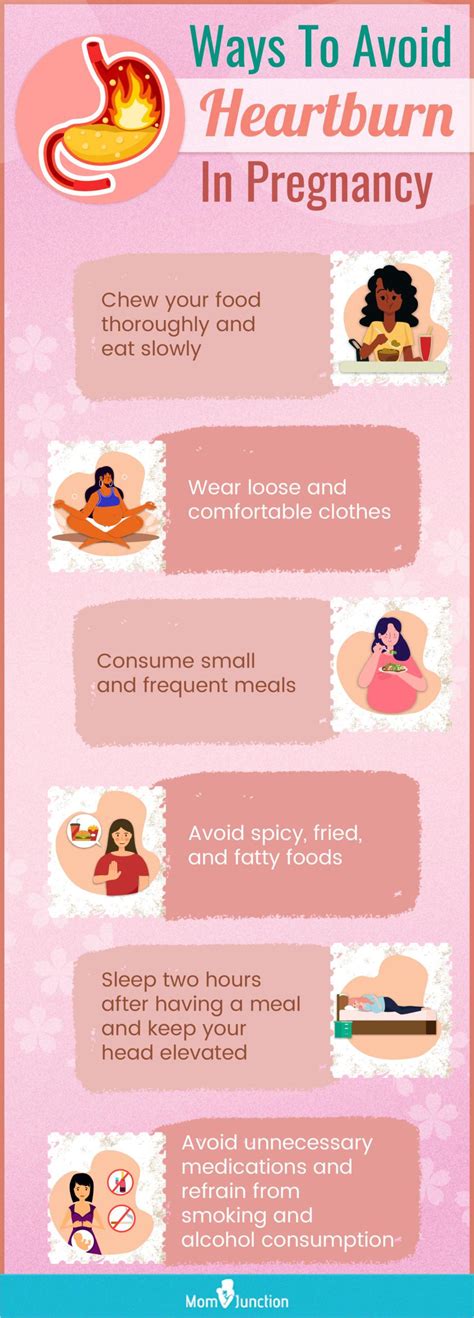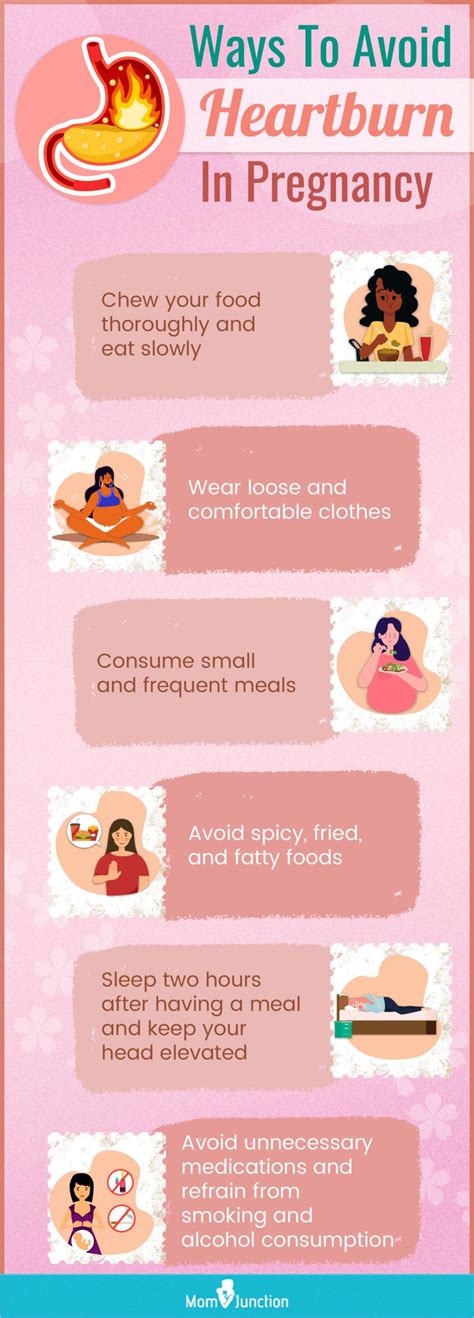Intro
Heartburn is a common complaint during the third trimester of pregnancy, affecting up to 70% of women. This uncomfortable burning sensation in the chest and throat is caused by stomach acid flowing back up into the esophagus, a condition known as acid reflux. As the pregnancy progresses, the growing uterus puts pressure on the stomach, causing the stomach acid to flow back up into the esophagus, resulting in heartburn.
The third trimester is a critical period for fetal development, and the mother's body undergoes significant changes to accommodate the growing baby. One of these changes is the relaxation of the lower esophageal sphincter, which is the muscle that separates the esophagus and stomach. This relaxation allows stomach acid to flow back up into the esophagus, causing heartburn. Additionally, the increased pressure on the stomach from the growing uterus can also cause stomach acid to flow back up into the esophagus, exacerbating heartburn symptoms.
Heartburn during the third trimester can be uncomfortable and disrupt daily activities, but there are ways to manage and alleviate symptoms. Understanding the causes and symptoms of heartburn, as well as the available treatment options, can help women navigate this challenging period and find relief. In the following sections, we will delve into the world of heartburn during the third trimester, exploring its causes, symptoms, treatment options, and prevention strategies.
Causes of Heartburn During the Third Trimester

The causes of heartburn during the third trimester are multifaceted and can be attributed to several factors. One of the primary causes is the relaxation of the lower esophageal sphincter, which allows stomach acid to flow back up into the esophagus. This relaxation is caused by the increased levels of progesterone, a hormone that helps to relax muscles during pregnancy. Additionally, the growing uterus puts pressure on the stomach, causing stomach acid to flow back up into the esophagus, resulting in heartburn.
Other factors that can contribute to heartburn during the third trimester include:
- Eating large or heavy meals, which can put pressure on the stomach and cause stomach acid to flow back up into the esophagus
- Lying down after eating, which can cause stomach acid to flow back up into the esophagus
- Consuming trigger foods, such as citrus fruits, tomatoes, and chocolate, which can relax the lower esophageal sphincter and allow stomach acid to flow back up into the esophagus
- Drinking carbonated beverages, which can cause the stomach to expand and put pressure on the esophagus
Symptoms of Heartburn During the Third Trimester
The symptoms of heartburn during the third trimester can vary from woman to woman, but common symptoms include: * A burning sensation in the chest and throat * A sour or bitter taste in the mouth * Difficulty swallowing * Coughing or wheezing * HoarsenessThese symptoms can be uncomfortable and disrupt daily activities, but there are ways to manage and alleviate them. In the next section, we will explore the treatment options available for heartburn during the third trimester.
Treatment Options for Heartburn During the Third Trimester

The treatment options for heartburn during the third trimester are varied and can include lifestyle changes, over-the-counter medications, and prescription medications. Lifestyle changes, such as eating smaller, more frequent meals, avoiding trigger foods, and elevating the head of the bed, can help to alleviate symptoms. Over-the-counter medications, such as antacids and histamine-2 (H2) blockers, can help to neutralize stomach acid and reduce symptoms.
Prescription medications, such as proton pump inhibitors (PPIs), can also be effective in reducing symptoms, but should only be used under the guidance of a healthcare provider. Additionally, natural remedies, such as ginger and aloe vera, may also be effective in alleviating symptoms.
It is essential to consult with a healthcare provider before taking any medication or trying any new remedy, as some may not be safe during pregnancy. In the next section, we will explore the prevention strategies for heartburn during the third trimester.
Prevention Strategies for Heartburn During the Third Trimester
Prevention is key when it comes to managing heartburn during the third trimester. By making a few simple lifestyle changes, women can reduce their risk of developing heartburn and alleviate symptoms. Some prevention strategies include: * Eating smaller, more frequent meals to reduce pressure on the stomach * Avoiding trigger foods, such as citrus fruits and tomatoes * Elevating the head of the bed to prevent stomach acid from flowing back up into the esophagus * Avoiding tight clothing, which can put pressure on the stomach * Practicing good eating habits, such as chewing slowly and thoroughlyBy following these prevention strategies, women can reduce their risk of developing heartburn and alleviate symptoms. In the next section, we will explore the relationship between heartburn and other pregnancy-related complications.
Heartburn and Other Pregnancy-Related Complications

Heartburn during the third trimester can be a sign of other pregnancy-related complications, such as preeclampsia and gestational diabetes. Preeclampsia is a condition characterized by high blood pressure and damage to the kidneys and liver, and can increase the risk of heartburn. Gestational diabetes, a condition characterized by high blood sugar levels, can also increase the risk of heartburn.
Additionally, heartburn can be a sign of other underlying conditions, such as gastroesophageal reflux disease (GERD), which can increase the risk of complications during pregnancy. It is essential to consult with a healthcare provider if symptoms persist or worsen over time, as they can indicate an underlying condition that requires medical attention.
In the next section, we will explore the FAQs related to heartburn during the third trimester.
What are the common symptoms of heartburn during the third trimester?
+The common symptoms of heartburn during the third trimester include a burning sensation in the chest and throat, a sour or bitter taste in the mouth, difficulty swallowing, coughing or wheezing, and hoarseness.
What are the treatment options for heartburn during the third trimester?
+The treatment options for heartburn during the third trimester include lifestyle changes, over-the-counter medications, and prescription medications. Lifestyle changes, such as eating smaller, more frequent meals, avoiding trigger foods, and elevating the head of the bed, can help to alleviate symptoms.
Can heartburn during the third trimester be a sign of other pregnancy-related complications?
+Yes, heartburn during the third trimester can be a sign of other pregnancy-related complications, such as preeclampsia and gestational diabetes. It is essential to consult with a healthcare provider if symptoms persist or worsen over time, as they can indicate an underlying condition that requires medical attention.
As we conclude this article, we hope that you have gained a better understanding of heartburn during the third trimester, its causes, symptoms, treatment options, and prevention strategies. If you have any questions or concerns, please do not hesitate to reach out to your healthcare provider. Additionally, we invite you to share your experiences and tips for managing heartburn during pregnancy in the comments section below. By sharing your stories and advice, you can help other women navigate this challenging period and find relief from heartburn symptoms.
